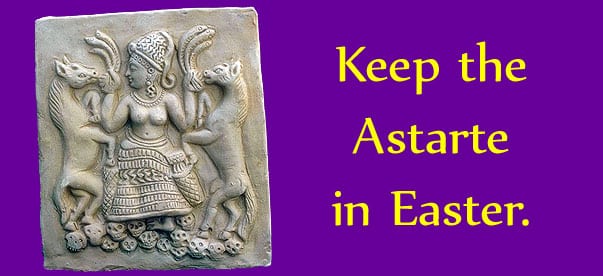Was Easter a Pagan Holiday? (Venerable Bede comes to the rescue!)
A subscriber recently wrote me on Facebook about a friend of his who claims that “Easter” is a pagan holiday that “true Christians” should not celebrate. To make matters more provocative, here’s a Pagan Meme going around the web:
He wanted me to me to explain the origin of their argument against Easter, and then refute it. Here goes…
Basing their hypothesis on a passage of the Venerable St. Bede, some Protestants claim that the northern European Christians adopted the name Easter from the name of a pagan goddess: “Eastre” in Anglo-Saxon; “Eostre” in Northumbrian. She is also the infamous Ashtorah of the Old Testament, the one for whom poles were erected as signs of fertility. The Hebrew prophets spilled much ink condemning the the idolatrous worship of Ashtorah (cf. Isaiah 17:8, 27:9, Jereimiah 17:2, Micah 5:14).
The name “Eastre” or “Astarte” or “Eostre” comes from the proto Indo-European root “aus/eas” meaning “to shine” and “the east” (since the sun shines from the east). Our word “east” clearly derives from this root. Likewise, the word Austria comes from the same Indo-European root since it is the kingdom of the east or the “austra”.
The Catholic Church does not formally call the feast “Easter” but rather “Pascha” – a word derived from the Aramaic word for “Passover”. Only English and Germanic lands use the term related to “Easter”.
This would be a convenient etymology since it avoids the pagan connotations. Instead, it connects the word to Christ rising from the dead.
I favor a third explanation. The Anglo-Saxons called the Spring equinox “Eostre”. It was a astronomical description. Since pagans ceremoniously celebrate astronomical events as holy days, the natural phenomenon (the spring equinox as a “shining”) and the religious feast (the goddess of fertility and light, Ashtorah) were indistinguishable.
Anglo-Saxons didn’t borrow the name of a goddess for the feast of Christ’s resurrection. They simply denoted it by the name of the natural phenomenon (the spring equinox which they called “Eostre”), since the festival is calculated by using marking the spring equinox. It happens that the name of the goddess and the name of the feast are etymologically connected. This would confirm the exact context of Bede’s words:
“Eostur-month, which is now interpreted as the paschal month, was formerly named after the goddess Eostre, and has given its name to the festival.”
This doesn’t mean that paganism was baptized or that the newly Christianized people were still devoted to the goddess Eostre. Think about it, we still speak of “Thursday” but that doesn’t mean that we really think of it as “Thor’s day.” Rather, the old day names remained without their religious content. The same goes for “Easter” as the name of the spring equinox – the name remained but the goddess did not. Anyone who claims that Catholics worship “Eostre” for saying “Easter” should have the tables turned on him and then be accused of worshiping “Thor” for saying “Thursday.”
Happy Easter or Pascha. Christ is risen! Alleluia!
Godspeed,
Taylor Marshall
Please join our list of 24,390 daily subscribers. It’s FREE and you get a FREE book: Thomas Aquinas in 50 Pages. Please click here to receive new daily posts instantly through e-mail. Privacy Guarantee: Your e-mail will never be shared with anyone.
What to Watch Next
SHOP THE TAYLOR MARSHALL STORE
Dive Deeper

GET CONFIDENT IN YOUR FAITH
Explore the fascinating world of Catholic teachings with Dr. Marshall. Together you’ll unpack the brilliant answers the Church gives to tough questions about the Faith. The best part: you go at your own pace. Start this exciting journey today.


 >
>



